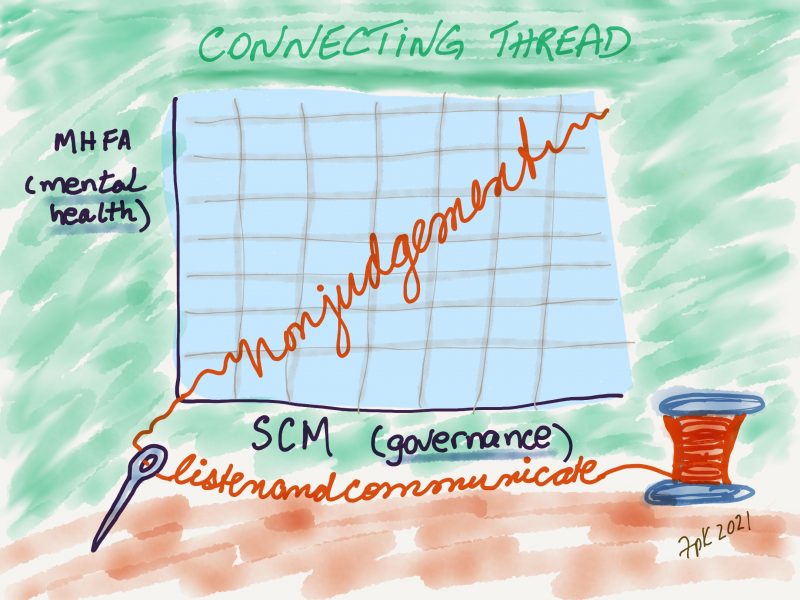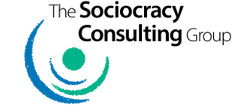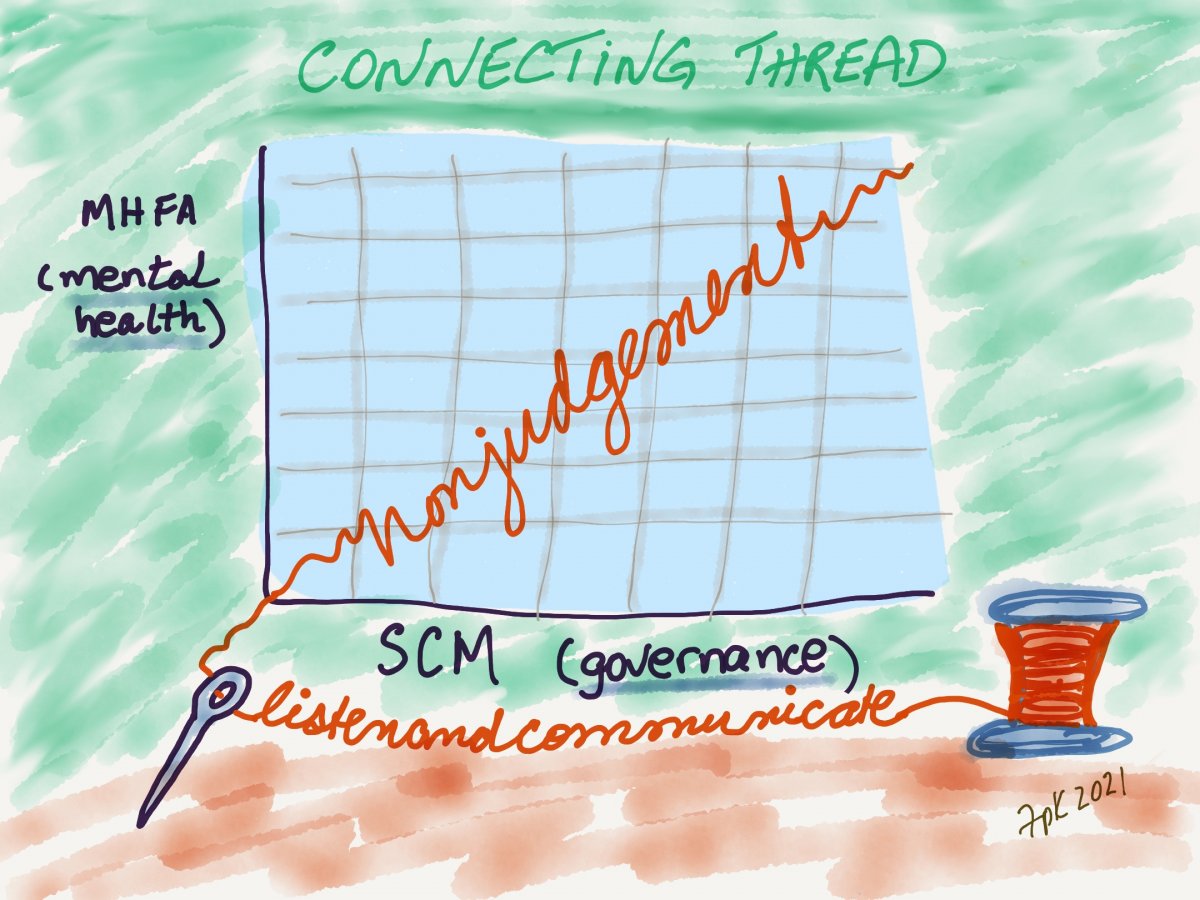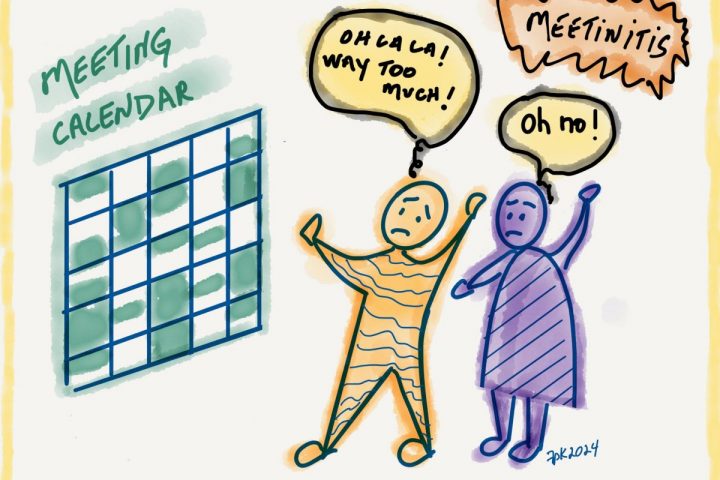 I’ve been working in the domains of organizational governance and positive mental health for more than ten years. At first, I did not see the connection between these two areas, keeping them in separate silos. I see it differently today. Let me explain more specifically by looking at the connecting thread between the Sociocratic Circle-organization Method (SCM) and Mental Health First Aid (MHFA), two areas I am passionate about.
I’ve been working in the domains of organizational governance and positive mental health for more than ten years. At first, I did not see the connection between these two areas, keeping them in separate silos. I see it differently today. Let me explain more specifically by looking at the connecting thread between the Sociocratic Circle-organization Method (SCM) and Mental Health First Aid (MHFA), two areas I am passionate about.
Brief definitions
Sociocracy, a whole-systems approach to governance, is designed to organize work and to make decisions that guide the work. The SCM sets the stage for a healthy organizational governance, creating psychologically-safe environments and productive organizations. It also sets the stage for more inclusive and effective organizations, where all stakeholders have a voice.
Positive mental health enables us to realise our potential and be active, productive members of our communities. Also known as “positive mental well-being,” it enables us to cope with stress effectively and bounce back from life challenges. MHFA training is designed to increase mental health literacy and reduce the stigma of mental health problems. This training provides skills and knowledge to act as a first aider to someone experiencing declining mental well-being.
This dashboard created by Canadian psychologist Dr. Georges Sabongui, PhD is useful in understanding the different levels of well-being. I have this dashboard on my wall as a reminder to check-in regularly with myself. How am I showing up? Is my stress manageable? How am I doing with my self-care strategies?
The pandemic and its topsy-turvy impact on our world has increased my stress. This has been an opportunity to practice what I preach! That is, to do my best in balancing the four dimensions that constitute my mental health: emotional, physical, mental and spiritual. A dash of humour and resilience also helps the mix. For me, this means limiting my screen time, going for walks, reaching out to family and friends, playing with the cats, meditating and eating one piece of decadent chocolate daily.
A Sociocratic Experience
I first learned about sociocracy when I worked for an organization that applied the SCM as an overlay to an existing structure. We were 17 employees with varying roles and responsibilities, participating fully in the fulfillment of our aims. As leader of one of the teams, I also took part in the “general circle” along with a delegate from my team. Each of us had a voice in policy decision-making. This was made possible with a circle structure that included the concept of double-linking, providing two-way feedback within the organization.
Early on after the implementation of the SCM at my workplace, one of the teams proposed to renovate a spare office into a mental wellness room for individuals to use at their discretion. Since this policy would affect all employees, it was brought to the general circle for their consideration and approval. After in depth discussion by all the members of the general circle, it was adopted by consent (no objections). Interestingly, this mental wellness benefit was never abused by the employees.
When healthy organizational governance and positive mental health are present on a team, chances are that contributions will be engaging and productive. In my experience, our policy meetings were recognized as a safe space to think outside the box and bring up new ideas to reach our circle’s aim. The opening round acted as a gauge of our well-being in the moment, welcomed with no judgment. This was helpful information for each of us as we tackled the agenda items.
I especially enjoyed the consent decision-making process, which uses rounds. For someone like me, who is sometimes too quiet, it encouraged me to contribute my part. The lack of interruptions while I expressed an idea made me feel valued and respected. And for colleagues who were more extroverted and at ease with speaking up, they knew that they would get their turn to speak during the round, with no cross-talk from others.
How we raised objections and addressed them as a team was very enriching. In this part of the process, everyone was encouraged to be frank, honest and open while focusing on our circle’s aim. We actually made a point of welcoming objections as gifts to improve the proposal idea. Even though the objection was raised by one person, the whole team took part in resolving the objection. Our meetings always ended with a closing round, providing a safe space for feedback on what worked well and what could be improved.
The SCM and MHFA: Connecting Thread
Let’s think about it. Each individual brings to a team their unique life experience, their personal views, their challenges, and their aspirations. So what happens when we feel stressed or worried or sick? Our ability to focus and concentrate may be decreased, affecting our problem-solving capacities and our productivity. This affects the whole team. We can say “Not me, I never bring my personal life into work”. This is almost impossible. We are humans, not robots. Our emotions inform how we react to situations in the present moment.
The MHFA weaves a connecting thread through the application of the SCM: listening and communicating nonjudgmentally. This is one of the six actions applied when providing first aid for mental health to someone with declining well-being. In my experience using the SCM, listening and communicating nonjudgmentally open the door to diversity of ideas and creativity, important to stimulate collective intelligence and innovation. It also raises the level of trust and psychological safety, which in turn affects a team’s positive mental health. I find it fascinating how MHFA’s “listening and communicating nonjudgmentally” loops back and forth through the SCM fabric, thereby strengthening the organization’s potential.
To learn more about the SCM and how it connects with MHFA, schedule a free introductory consultation.
Thanks to Sheella Mierson for editing assistance with this blog.
 A founding member of The Sociocracy Consulting Group, Francine Proulx-Kenzle’s vision is a world in which all voices are heard with respect and candor, and where decisions are made collaboratively to contribute to better working and living environments.
A founding member of The Sociocracy Consulting Group, Francine Proulx-Kenzle’s vision is a world in which all voices are heard with respect and candor, and where decisions are made collaboratively to contribute to better working and living environments.




